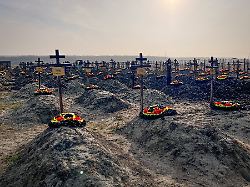More than 1300 dead counted
Discoverer of Wagner cemetery flees from Russia
4/9/2023, 6:16 p.m
He is said to have been the first to discover the growing cemetery of the Russian mercenary group Wagner: According to media reports, Vitaly Votanovsky is now fleeing Russia. This was preceded by numerous death threats.
A Russian activist who had discovered and publicized the now notorious cemetery of the Wagner mercenary group has left Russia, as did the internet newspaper first The Moscow Times reported. Vitaly Votanovsky documented the deaths of Russian soldiers in Ukraine by monitoring cemeteries in his home region. On April 4, he left, according to the BBC his home country after receiving numerous death threats.
According to the BBC, Votanovsky was the first to discover the cemetery in Bakinskaya, Russia, where numerous mercenaries from the Wagner group who were killed in Ukraine are buried. He also documented new graves of regular Russian soldiers: counted them, took photos and wrote down their names. Before he escaped, he had collected more than 1,300 names, and that was only in the area around the city of Krasnodar.
“Had to prove catastrophe”
In an interview with the BBC, Votanovsky said: “I had to prove to people that there was a catastrophe. That people were dying here, very close to them.” Death threats began after he first posted about the graves online, Votanovsky said. He had fled to Armenia and wanted to ask for asylum in Germany.
The notorious mercenary group buries many of their dead from Ukraine at the Wagner Cemetery in Bakinskaya. They are men who either have no relatives or whose bodies have not been claimed. From a small village cemetery, it has now grown into a huge cemetery. He has several new zones to accommodate the ever-increasing body count. Security forces are patrolling the facility, according to the BBC.
Wagner boss: Cemetery is growing
The head of the Wagner mercenary group, Yevgeny Prigoschin, had recently shown himself in a video at the cemetery. The recordings had been published by his press service. “Yes, (the graveyard) is growing. Those who fight sometimes die,” Prigozhin said. “Wagner’s fighters are still buried here and there hasn’t been a problem with that to this day,” he adds. “We will (…) make a monument out of this cemetery for future generations.”
The Wagner forces lead offensives in eastern Ukraine, around the town of Bakhmut, where the longest and bloodiest battles of the Russian military campaign are taking place. Both sides suffered heavy casualties there. Founded in 2014, the Wagner Group has also been involved in conflicts in Africa, Latin America and the Middle East. Up until February, Prigozhin had recruited prison inmates for months and promised them amnesty if they returned to Russia after surviving combat operations in Ukraine.
